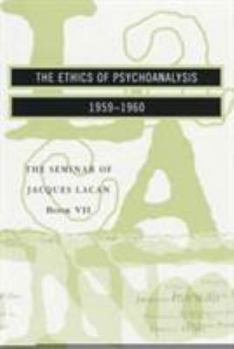Le séminaire de Jacques Lacan. Livre VII. L'éthique de la psychanalyse (1959-1960)
(Book #7 in the Le Séminaire Series)
Select Format
Select Condition 
Book Overview
Lacan dedicates this seventh year of his famous seminar to the problematic role of ethics in psychoanalysis. Delving into the psychoanalyst's inevitable involvement with ethical questions and the attraction of transgression, Lacan illuminates Freud's psychoanalytic work and its continued influence. Lacan explores the problem of sublimation, the paradox of jouissance, the essence of tragedy (a reading of Sophocle's Antigone), and the tragic dimension of analytic experience. His exploration leads us to startling insights on the consequence of man's relationship to desire and the conflicting judgments of ethics and analysis.
Format:Paperback
Language:English
ISBN:0393316130
ISBN13:9780393316131
Release Date:July 1997
Publisher:W. W. Norton & Company
Length:352 Pages
Weight:1.07 lbs.
Dimensions:0.7" x 6.0" x 9.0"
Customer Reviews
2 ratings
where's the ding?
Published by Thriftbooks.com User , 17 years ago
something lacan says in the last chapter is a good place to begin: 'since one should always start up again with a definition, let's say that an ethics essentially consists in a judgment of our action, with the proviso that it is only significant if the action implied by it also contains within it, or is supposed to contain, a judgment, even if it is only implicit.' and now leaping backwards to the first chapter: 'we are faced with the question of what analysis allows us to formulate concerning the origin of morality. 'is its contribution limited to the elaboration of a mythology that is more credible and more secular than that which claims to be revealed? i have in mind the reconstructed mythology of "totem and taboo", which starts out from the experience of the original murder of the father, from the circumstances that give rise to it and its consequences.' the main freudian text lacan urges on those in attendance is "civilization and its discontents", which opens up lacan's talk to kant and sade. actually, aristotle, kant and sade. the good as the happy life, put forth by aristotle in his golden mean lacan rejects as dated, an ethics for the masters of ancient greece. also there's a problem with aristotle's prime mover of the universe. civilization, modern civilization, picks up, begins again, becomes relevant,in the 17th century. a century later the waking kant introduced to the world his categorical imperative, and man's relationship with jehovah and jesus. the rituals of purification, sublimation, catharsis, are discussed and used, aristotle said, by the arts, and the gods figured prominantly in the greek arts. voices in disciplines outside philosophy, have placed the rituals within theology and mythology. lacan's interpretaton of sophocles' antigone combine the disciplines. there seems to be a stir among those in attendance concerning the many books lacan has read that he urges on those in attendance to read. a stir lacan doesn't like and makes known his discontent to his students. this seminar is translated into english by dennis porter, who appears to have caught some of lacan's word play: moral register and cash register, the good and the service of goods. i waited for the golden mean and meaning, but i guess the opportunity did not present itself. though as a transgression, porter may... . i'll stop, maybe someday mr porter will do a translation of another one of the seminars.
Satisfaction of Hours
Published by Thriftbooks.com User , 18 years ago
Lacan is one of the most enigmatic, fascinating, and turgid philosophers (argue if you will)/creators to have ever lived. This volume is Lacan at his best. One may spend hours on an essay, Das Ding, for example. The pay-off, however, is incalculable. His interpretation of Antigone in this volume rates among the best ever elaborated by a theorist of any type. He shows this first true literary heroine in all of her sublimity. Whereas Heidegger deals with Antigone abstractly, Lacan writes as if he knew her: as if her loved her and needs to tell us the motivation behind her tragic necessity. While perhaps not the perfect Seminar of Lacan's with which to begin, it is far from the worst. Certainly it is essential once one has been introduced to Lacan's thought. Moreover, the very title of the Seminar, "The Ethics of Psychoanalysis," is enough to justify the time it takes to examine it. Indeed, the title is to be taken in two senses, both as the ethical doctrine that should be practiced by the analyst, and as a possible opening into an altogether different experience of thinking about ethics for the non-analyst. This is a truly essential book.





